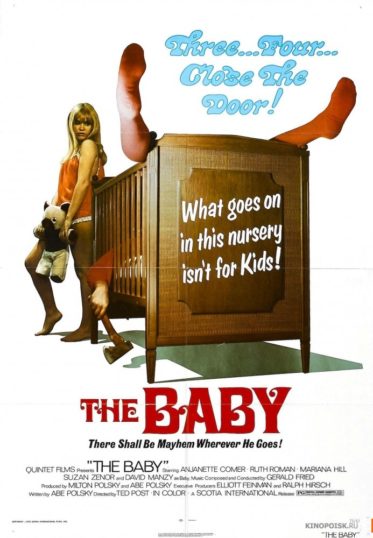 This early seventies sickie is a real curiosity: an exploitation movie about a grown man raised as an infant. A neglected classic? Hardly, but the film is an intriguing piece of work: morose and unflinchingly perverse without ever indulging in gratuitous sex and violence.
This early seventies sickie is a real curiosity: an exploitation movie about a grown man raised as an infant. A neglected classic? Hardly, but the film is an intriguing piece of work: morose and unflinchingly perverse without ever indulging in gratuitous sex and violence.
It shouldn’t surprise that THE BABY, with its hopeless, mean-spirited worldview, was released in 1973, during the waning years of the Vietnam War and the resignation of President Richard Nixon. The film’s unrelenting grimness is very much in keeping with exploitation movies of the time like THE LAST HOUSE ON THE LEFT and THE CANDY SNATCHERS, not to mention big budget affairs like THE FRENCH CONNECTION and THE EXORCIST.
THE BABY, alas, remains something of an obscurity. It doesn’t appear to have received much attention during its initial release (when it was somehow given a PG rating!), even though the film is definitely above-average for its type, and nor has it had much of an afterlife on the home video market. It was briefly released on VHS back in the eighties (now out of print) and on DVD by Image Entertainment (likewise OOP), but it’s recently shown up on again on DVD, courtesy of the indie company Genon, which you can get for around $5.99…so now you have NO excuse not to check it out!
Ann is a dedicated social worker who finds herself dumbfounded when she arrives at the home of her latest client, a middle aged woman who lives with her two teenaged daughters and “Baby”, who is in fact a young man dressed and treated like an infant. Ann quickly becomes obsessed with “saving” Baby, and makes quite a few visits to his twisted household, much to the consternation of his mother and sisters.
In the meantime we’re given a glimpse of Baby’s day-to-day reality, which includes being sexually manhandled by a babysitter (who his mother brutally beats for her transgressions) and zapped with an electric rod by his sadistic siblings. Ann decides to sue for custody of Baby, although it becomes increasingly apparent that the woman is not the pure-hearted crusader she initially appears: Ann lives alone with her mother, having been severely traumatized by the death of her loving spouse, and her all-consuming desire to save Baby takes on a decidedly unhealthy air. She kidnaps Baby from his birthday party and taunts his mother by sending her pictures of Baby standing upright. The family springs into action, showing up at Ann’s house one night to re-capture Baby. There’s a surprise in store, though, for Baby, his family, and the viewer!
The director was Ted Post, a prolific hack during the seventies who’s responsible for quite a few unremarkable films (including BENEATH THE PLANET OF THE APES, THE HARRAD EXPERIMENT and MAGNUM FORCE, in my view the least of the Dirty Harry flicks). His helming here is typically unremarkable, with flat compositions best suited to the small screen (where, unsurprisingly, much of Post’s work was done). In this case, however, Post’s unimaginative direction actually works in the film’s favor somewhat, as the sight of a grown man acting like an infant doesn’t need a lot of adornment to repulse and disturb. Post correctly never treats the material in a self-conscious or comedic manner, which would have cheapened it considerably (and anyway would have been far too easy).
Performance-wise, Anjanette Comer and Ruth Roman are adequate as the social worker and mother, while exploitation stalwart Mariana Hill (from MESSIAH OF EVIL and BLOOD BEACH, among many others) and Suzanne Zenor add the requisite sex appeal as Baby’s sisters. That leaves David Mooney as Baby, who proves disconcertingly convincing as a grown-up infant; Mooney wails, crawls around and generally acts infantile enough to make even the hardiest viewer squirm in discomfort.
Vital Statistics
THE BABY
Quintet Films
Director: Ted Post
Producers: Milton Polsky, Abe Polsky
Screenplay: Abe Polsky
Cinematography: Michael Margulies
Editing: Bob Crawford, Dick Wormell
Cast: Anjanette Comer, Ruth Roman, Mariana Hill, Suzanne Zenor, “David Manzy” (David Mooney), Tod Andrews, Michael Pataki, Beatrice Manley
